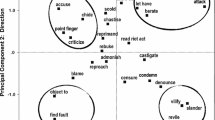Abstract
Moral HRI is investigating humans’ perception and reasoning regarding robots’ responses to moral dilemmas. Understanding moral dilemmas as cases of tragedy, we identify creative responses as an alternative to responses based on ethical principles such as deontology or utilitarianism. We propose a computational procedure based on AI planning that can generate such responses. We report results from an exploratory study to obtain a preliminary understanding of how the character of creative ethical reasoning robots is perceived compared to the more commonly discussed utilitarian and deontological robots.
Access this chapter
Tax calculation will be finalised at checkout
Purchases are for personal use only
Similar content being viewed by others
References
Asimov, I.: Runaround. Gnome Press, New York (1950)
Awad, E., et al.: The moral machine experiment. Nature 563, 59–64 (2018)
Carpinella, C.M., Wyman, A.B., Perez, M.A., Stroessner, S.J.: The robotic social attributes scale (RoSAS): development and validation. In: HRI 2017 Proceedings of the 2017 ACM/IEEE International Conference on Human-Robot Interaction, pp. 254–262 (2017)
Kaufman, J.C., Baer, J.: Sure, i’m creative – but not in mathematics!: self-reported creativity in diverse domains. Empirical. Stud. Arts. 22(2), 143–155 (2004)
Kohlberg, L.: The Philosophy of Moral Development Moral Stages and the Idea of Justice. Harper & Row, San Francisco (1981)
Kuhnert, B., Lindner, F., Bentzen, M.M., Ragni, M.: Perceived difficulty of moral dilemmas depends on their causal structure: a formal model and preliminary results. In: Proceedings of the COGSCI 2017 (2017)
Lindner, F., Bentzen, M.M.: The hybrid ethical reasoning agent IMMANUEL. In: Proceedings of the Companion of the 2017 ACM/IEEE International Conference on Human-Robot Interaction, pp. 187–188. ACM (2017)
Lindner, F., Mattmüller, R., Nebel, B.: Moral permissibility of action plans. In: Proceedings of AAAI, vol. 2019, no. 33, pp. 7635–7642 (2019). https://doi.org/10.1609/aaai.v33i01.33017635
Lindner, F., Wächter, L., Bentzen, M.M.: Discussions about lying with an ethical reasoning robot. In: Proceedings of the 26th IEEE International Symposium on Robot and Human Interactive Communication (RO-MAN), pp. 1445–1450. IEEE, New York (2017)
Malle, B.F., Scheutz, M., Arnold, T., Voiklis, J., Cusimano, C.: Sacrifice one for the good of many?: people apply different moral norms to human and robot agents. In: HRI 2015 Proceedings of the 2015 ACM/IEEE International Conference on Human-Robot Interaction, pp. 117–124. ACM, New York (2015)
Runco, M.A.: Everyone has creative potential. In: Sternberg, R.J., Grigorenko, E.L., Singer, J.L. (eds.) Everyone Has Creative Potential, pp. 21–30. American Psychological Association, Washington (2004)
Sommaggio, P., Marchiori, S.: Break the chains: a new way to consider machine’s moral problems. BioLaw J. Rivista di BioDiritto 3, 241–257 (2018)
Wächter, L., Lindner, F.: An explorative comparison of blame attributions to companion robots across various moral dilemmas. In: Proceedings of the 6th International Conference on Human-Agent Interaction (HAI 2018), pp. 269–276. ACM, New York (2018)
Weber, T.B.: Tragic dilemmas and the priority of the moral. J. Ethics. 4(3), 191–209 (2000). https://doi.org/10.1023/A:1009864421398
Weston, A.: Creative Problem-Solving in Ethics. Oxford University Press, New York (2006)
Author information
Authors and Affiliations
Corresponding author
Editor information
Editors and Affiliations
Rights and permissions
Copyright information
© 2019 Springer Nature Switzerland AG
About this paper
Cite this paper
Lindner, F., Kuhnert, B., Wächter, L., Möllney, K. (2019). Perception of Creative Responses to Moral Dilemmas by a Conversational Robot. In: Salichs, M., et al. Social Robotics. ICSR 2019. Lecture Notes in Computer Science(), vol 11876. Springer, Cham. https://doi.org/10.1007/978-3-030-35888-4_10
Download citation
DOI: https://doi.org/10.1007/978-3-030-35888-4_10
Published:
Publisher Name: Springer, Cham
Print ISBN: 978-3-030-35887-7
Online ISBN: 978-3-030-35888-4
eBook Packages: Computer ScienceComputer Science (R0)




